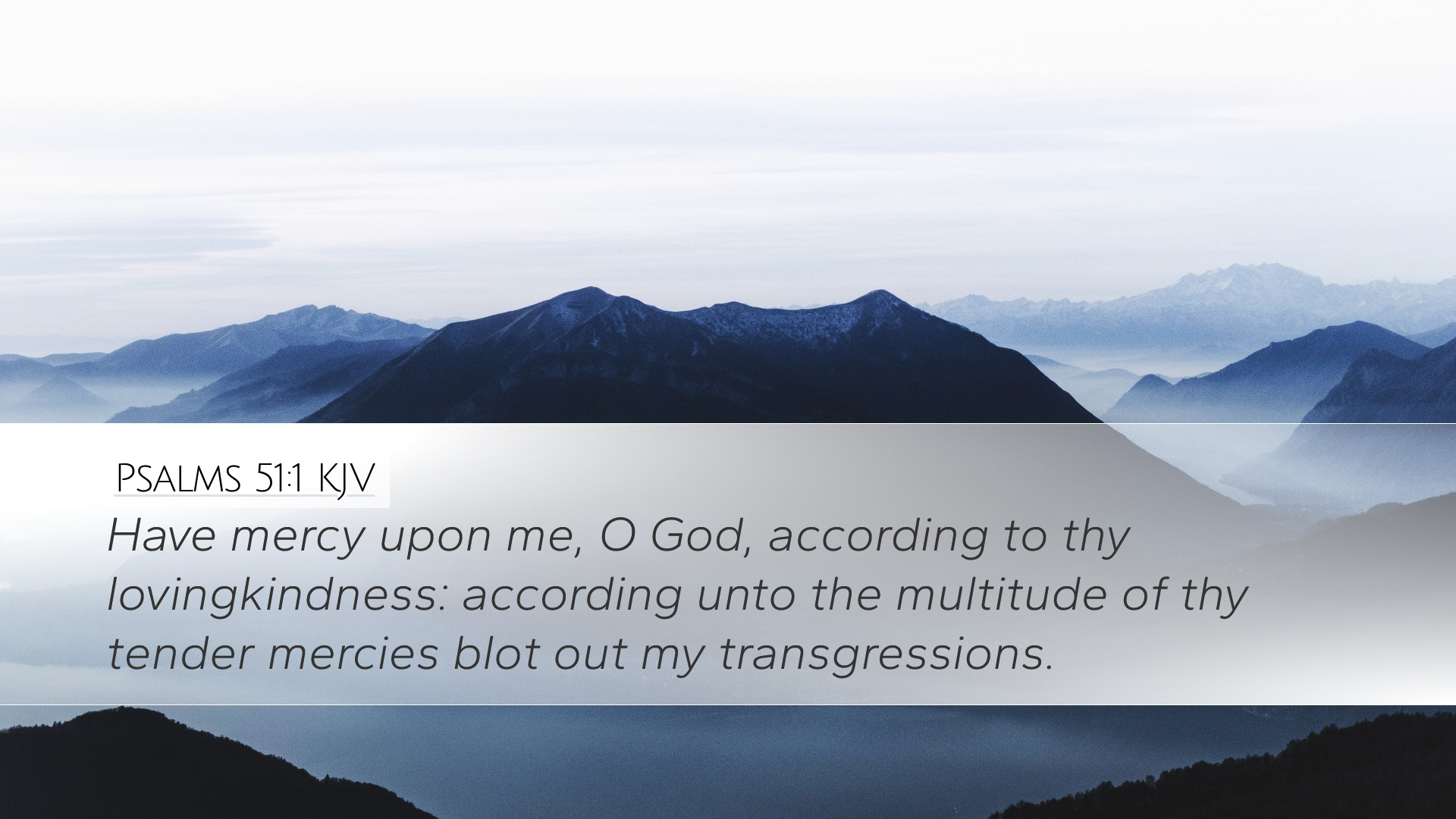Commentary on Psalms 51:1
Psalms 51, ascribed to David after his sin with Bathsheba, stands as a poignant cry for mercy and repentance. In Psalms 51:1, David implores God with the appeal:
"Have mercy upon me, O God, according to Thy lovingkindness: according unto the multitude of Thy tender mercies blot out my transgressions."
Overview of the Psalm
This penitential psalm embodies a heartfelt confession from David, acknowledging his sin and seeking divine forgiveness. It serves as a template for repentance, highlighting essential elements of the confession process that are relevant for both personal and communal worship.
Insights from Key Commentators
-
Matthew Henry observes that this psalm reflects the sincere contrition that should accompany repentance. He emphasizes the importance of recognizing God's forgiveness as an act of mercy rather than a result of merit.
-
Albert Barnes focuses on the term "mercy" in the context of God’s character. He elaborates on the Hebrew understanding of mercy as a profound aspect of God’s nature, rooted in His covenant love and faithfulness. Barnes points out that David appeals to God’s unfailing nature, underscoring human unworthiness and God’s grace.
-
Adam Clarke provides insight into the urgency and desperation found in David’s plea. He remarks that the phrase "according to Thy lovingkindness" illustrates both David’s understanding of God’s covenant faithfulness and the depths of his plea for cleansing. Clarke emphasizes the phrase "blot out my transgressions," signifying a desire for complete removal of guilt and sin.
Theological Implications
Psalms 51:1 raises several theological themes relevant for spiritual leaders and scholars.
-
God’s Mercy: The psalmist's acknowledgment of God’s mercy highlights an essential aspect of divine character. Understanding God's readiness to forgive can encourage believers to seek Him in repentance.
-
The Nature of Sin: David's transparent acknowledgment of his transgressions lays a foundation for discussions surrounding sin, guilt, and the need for divine intervention in the human condition.
-
Repentance: This text serves as a catalyst for understanding genuine repentance—a turning away from sin and an earnest seeking of God’s cleansing power. It prompts leaders to teach that true repentance is marked by a deep awareness of one’s failures and a sincere request for God’s mercy.
-
The Role of Prayer: David’s direct appeal to God emphasizes the importance of prayer in the life of a believer, particularly in times of moral failure. His example models an urgent, honest conversation with God that is critical in seeking restoration.
-
Restoration: The longing for the removal of transgressions points to the greater biblical narrative of redemption that culminates in Christ. This connection provides a rich field for ongoing theological reflection on forgiveness and restoration for believers today.
Practical Applications
For pastors and church leaders, the themes in this verse can inform pastoral care and counseling practices. Here are some applications derived from the verse:
-
Encourage congregants to embrace their need for divine mercy actively.
-
Preach on the importance of humility and honesty in confession as vital steps toward restoration in one’s relationship with God.
-
Incorporate themes of grace into teachings about sin, helping believers understand that God’s forgiveness is available and abundant.
-
Offer guidance on how to structure personal prayers of confession, inspired by David’s heartfelt plea.
-
Create opportunities for corporate confession within the church setting that reflect the communal aspect of seeking mercy and restoration.
-
Use this psalm as a foundation for discussions on the nature of true repentance and its implications for spiritual growth.
-
Foster an environment where people feel safe to confess and receive counsel about the struggles of sin, mirroring David’s transparency.
-
Highlight the new covenant of grace through Christ as the ultimate fulfillment of the request in Psalms 51:1, incorporating teachings of redemption and hope.
-
Lead congregants in prayer that reflects the themes of need, mercy, and thanksgiving found in this psalm.
Conclusion
Psalms 51:1 offers profound insights into the nature of God, the gravity of sin, and the necessity of heartfelt repentance. The combined wisdom of the commentators not only enriches our understanding of this verse but also calls us into deeper relationship with God. As we reflect on David’s cry for mercy, may it compel us toward authentic living marked by humility, gratitude, and a transformative experience of God’s grace.


